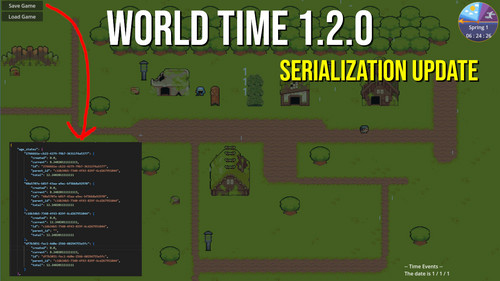🌍 World Time 1.2.0 – Serializable Time and Age States, Refactored Core Logic, and More

World Time 1.2.0 introduces persistent serialization support for your time systems — including TimeState, WorldAgeSystem, and the runtime AgeStates attached to each AgeingComponent.
Saving and loading is now fully supported out of the box via a new scene node: WorldTimeSerializer, designed to integrate seamlessly with your game’s existing save/load pipeline.
💥 Breaking Changes
-
SceneReplacement is now a Node called AgeingSceneReplacement and needs to be added to your scenes seperately. It targets the AgeingComponent to get the AgeState.
-
AddAfterGameSeconds renamed from AddAfterGameSecondsComponent
-
AddWhenAgeing renamed from AddWhenAgeingComponent
🧠 Under the Hood: Refactoring for the Future
This release started as a bugfix… and quickly became a major architectural update focused on testability, maintainability, and plugin stability.
Most logic has moved into standalone classes (like TimeStateLogic and CalendarLogic), making unit testing and component reuse much easier.
✅ 239/239 GdUnit tests currently pass — but if you hit issues, please reach out! (Note: In 1.2.1 the remaining tests have been brought back in and confirmed passing.)
🔄 What’s Changed at Runtime?
You’ll still use the same scene nodes and the GameCalendar resource, but there’s one big shift:
🔁 AgeState is now runtime-only
-
AgeState is no longer a Resource — it’s now a RefCounted runtime object.
-
AgeingComponent holds the scene’s AgeState and exposes it to connected nodes.
-
Scripts like AddWhenAgeing and AgeingSceneReplacement now reference AgeingComponent, not a global registry.
-
AgeStates are automatically registered/unregistered via AgeingComponent, simplifying save/load via WorldTimeSerializer.
🧾 Patch Notes: World Time v1.2.0
✨ New Features
-
WorldTimeSerializer: Central node for serializing and restoring all time systems.
-
Included by default in world_time_systems.tscn.
Age System Updates:
-
AgeState: Now a runtime-only RefCounted object.
-
AgePreset: Optional Resource for default age values.
-
AgeingComponent: Attach to any scene for age tracking.
-
AgeingSceneReplacement: Swap scenes when an age threshold is met.
-
AddWhenAgeing: Add values/resources when specific ages are crossed.
🧩 Logic Refactor Highlights
All core logic now lives in clean, scene-independent classes:
-
DayNightCycleLogic: Handles transitions and current/next TimeOfDay.
-
CalendarLogic: Manages date advancement, weeks, and validation.
-
TimeStateLogic: Drives game time updates and emits signals.
-
GameTimeSystemLogic: Ticks time, processes next-day events, updates TimeState.
✅ Why It Matters
-
Testable: Logic is modular and decoupled from scenes or UI.
-
Maintainable: Clear class responsibilities = fewer bugs, easier upgrades.
-
Extensible: Replace or extend logic without breaking your system.
-
Production-Ready: Built-in save/load support for time-based systems.
📌 Notes for Upgraders
-
Add WorldTimeSerializer to your scene tree and connect it to your save system.
-
Use AgePreset to define default ages for AgeingComponent nodes.
-
Update age-aware scripts to use AgeingComponent instead of managing AgeStates manually.
This update took longer than expected, but it’s a major step toward a rock-solid, save/load-ready time system.If you’re already using World Time — thank you! 💛 And as always, feedback and bug reports are hugely appreciated 🙏
Files
Get World Time & Game Calendar Plugin for Godot 4
World Time & Game Calendar Plugin for Godot 4
Persistent time, dynamic worlds, seamless aging.
| Status | In development |
| Category | Assets |
| Author | Chris' Tutorials |
| Tags | 2D, Godot, godot4, lighting, plugin, time |
More posts
- 📅✨ v1.2.2 — Fixes for Calendar UI Sync & Day 1 Event TriggersMay 29, 2025
- 🧾 v1.2.1 - Minor Fixes, 356/356 Tests PassingMay 23, 2025
- 1.1.2 Ageing Demo, Improvements, and FixesFeb 05, 2025
- 1.1.1 Time DialFeb 04, 2025
- 1.1 Visual Calendar, Weeks, Event Days, and Event Response ScriptsJan 31, 2025
- 1.0.2 Starting Date HotfixAug 07, 2024
- 1.0.1 Bug Fixes & Warning ImprovementsMay 10, 2024
- 1.0.0 Release - Stateful Shared ResourcesMay 05, 2024
- 0.4.1 Full Video Tutorial, Useful Tester UIs, and Bug FixesOct 25, 2023
Leave a comment
Log in with itch.io to leave a comment.